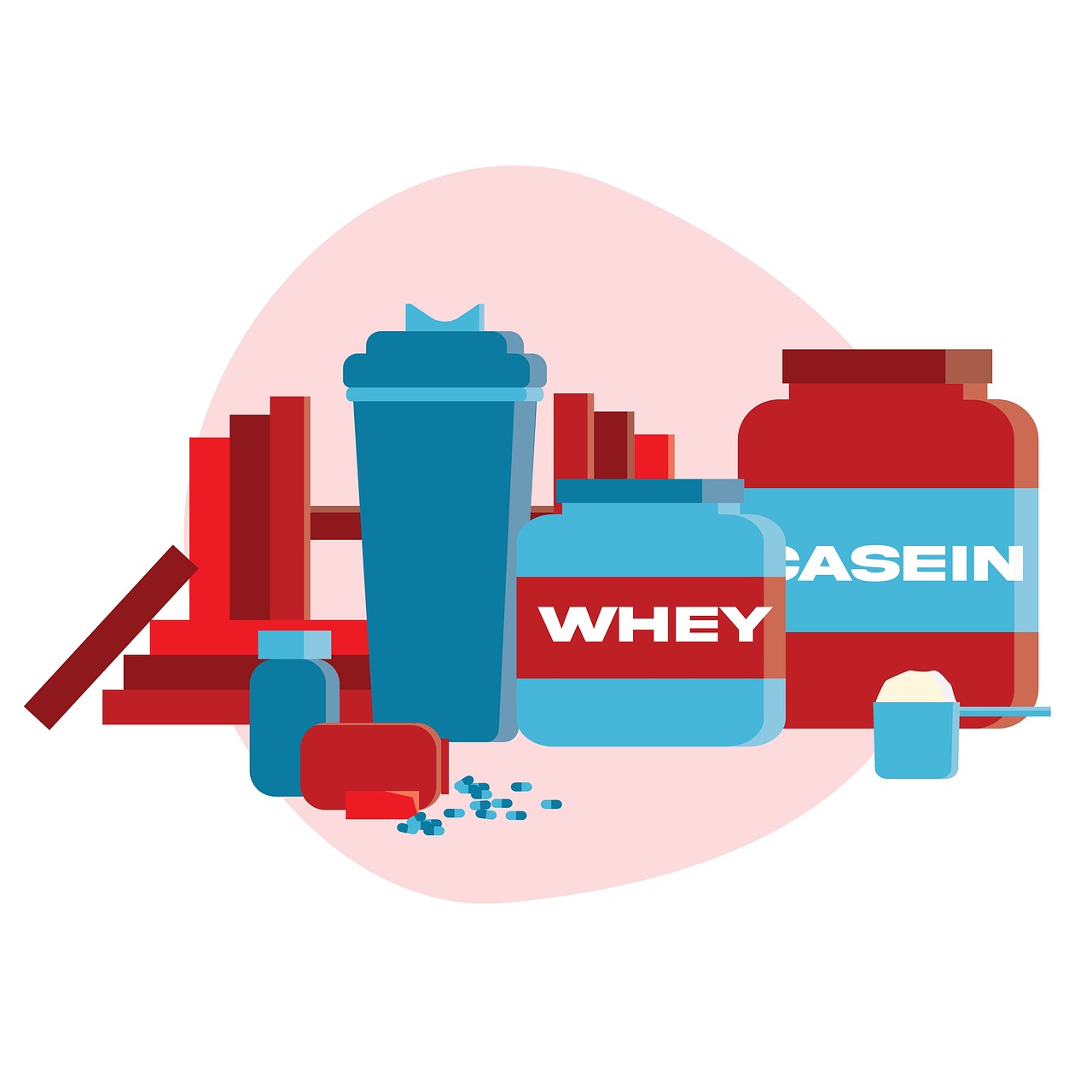Chemical Composition of Whey Protein:
Whey protein is a concentrated animal-based protein obtained from casein precipitation by maintaining the pH of milk at ∼4.6. (1,2)
Whey proteins usually comprise;
- β-lactoglobulin(∼65%)
- α-lactalbumin(∼25%)
- Bovine serum albumin(∼8%)
- Immunoglobulins
- Lactoferrin
- Enzymes
- Fats
- Lactose
Different protein products have different protein concentrations, i.e.
- Whey protein powder(∼15%)
- Whey protein concentrate(∼80%)
- Whey protein isolate(∼95%)

Optimum Protein Intake:
Our daily diet does not contain enough protein to meet our bodily demands. According to the DRI, 0.8gm/kg of protein is required daily for optimal health. (3,4)
Click here to calculate your daily protein intake.
Proteins should contribute 10-35% of your daily calorie intake. (5)
Can Whey Protein Cause Weight Gain?
Whey protein, generally used in protein shakes, powders, and other concentrates, has several health benefits. Evidently, it can help in(6)
- Muscle anabolism
- Increasing BMR
- Mitigating oxidative stress
- Decreasing insulin resistance
- Immunomodulation
- Boost gut flora health
- Muscle and injury repair
- Osteoporosis prevention
- Preventing skin ageing
- Suppression of tumour growth
- Preventing diabetes and obesity(7,8)
The answer to the question of whether whey protein causes weight gain can be determined after considering its health benefits.
Muscle anabolism, anti-oxidant properties, and low insulin resistance, combined with other factors, all have a cumulative anti-obesity effect.
Several Animal and human studies suggest that whey protein assists in weight loss.(9,10,11)
However, excess protein intake can cause weight gain due to gluconeogenesis as extra protein is converted into glucose and fat. (12)
What to do if Gaining Weight:
Gaining weight while taking protein supplements(shakes or powders) is a rare phenomenon, however, certain things should be kept in while taking them;
- Carefully read about the scoop size, a scoop generally contains 20-30gm of protein.
- Read about additional contents, i.e. carbohydrates and fats(higher protein concentrations will be more beneficial)
- Calories per serving should not exceed more than 35% of daily calorie intake.
- Whey protein can cause weight gain if you are not having physical exertion, so, scheduling exercise is crucial.
Take Home Message:
Although whey protein has a lot of benefits for health, but;
Excess of everything is bad.
An optimal diet is the key to success in weight management. While losing weight, diet contributes 70-80%. Contrary to that exercise is only 20%-30%. Optimal diet and exercise will ultimately lead to optimal health.
References:
- Zhong Zhang, Guoying Hao, Chen Liu, Junqing Fu, Dan Hu, Jianhui Rong, Xingbin Yang, Recent progress in the preparation, chemical interactions and applications of biocompatible polysaccharide-protein nanogel carriers, Food Research International, Volume 147, 2021, 110564, ISSN 0963-9969, https://doi.org/10.1016/j.foodres.2021.110564.
- Luo, T. Wang, Chapter 9 – Pharmaceutical and Cosmetic Applications of Protein By-Products, Editor(s): Gurpreet Singh Dhillon, Protein Byproducts, Academic Press, 2016, Pages 147-160, ISBN 9780128023914, https://doi.org/10.1016/B978-0-12-802391-4.00009-4.
- Paddon-Jones, Douglasa; Leidy, Heatherb. Dietary protein and muscle in older persons. Current Opinion in Clinical Nutrition and Metabolic Care 17(1):p 5-11, January 2014. | DOI: 10.1097/MCO.0000000000000011
- National Research Council (US) Subcommittee on the Tenth Edition of the Recommended Dietary Allowances. Recommended Dietary Allowances: 10th Edition. Washington (DC): National Academies Press (US); 1989. 6, Protein and Amino Acids. Available from: https://www.ncbi.nlm.nih.gov/books/NBK234922/
- Wolfe RR, Cifelli AM, Kostas G, Kim IY. Optimizing Protein Intake in Adults: Interpretation and Application of the Recommended Dietary Allowance Compared with the Acceptable Macronutrient Distribution Range. Adv Nutr. 2017 Mar 15;8(2):266-275. doi: 10.3945/an.116.013821. PMID: 28298271; PMCID: PMC5347101.
- Seema Patel, Functional food relevance of whey protein: A review of recent findings and scopes ahead, Journal of Functional Foods, Volume 19, Part A, 2015, Pages 308-319, ISSN 1756-4646, https://doi.org/10.1016/j.jff.2015.09.040.
- Lesgards JF. Benefits of Whey Proteins on Type 2 Diabetes Mellitus Parameters and Prevention of Cardiovascular Diseases. Nutrients. 2023 Mar 6;15(5):1294. doi: 10.3390/nu15051294. PMID: 36904293; PMCID: PMC10005124.
- Hirose Y, Kurimoto M, Yuda N, Tanaka M. Identification of Whey Protein-Derived Anti-Obesity Peptides Through 3T3-L1 Adipocyte Differentiation Assay. Food Sci Nutr. 2024 Oct 21;12(11):9641-9650. doi: 10.1002/fsn3.4529. PMID: 39620029; PMCID: PMC11606838.
- Frestedt JL, Zenk JL, Kuskowski MA, Ward LS, Bastian ED. A whey-protein supplement increases fat loss and spares lean muscle in obese subjects: a randomized human clinical study. Nutr Metab (Lond). 2008 Mar 27;5:8. doi: 10.1186/1743-7075-5-8. PMID: 18371214; PMCID: PMC2289832.
- Batsis JA, Petersen CL, Cook SB, Al-Nimr RI, Driesse T, Pidgeon D, Fielding R. Impact of whey protein supplementation in a weight-loss intervention in rural dwelling adults: A feasibility study. Clin Nutr ESPEN. 2021 Oct;45:426-432. doi: 10.1016/j.clnesp.2021.07.006. Epub 2021 Jul 24. PMID: 34620350; PMCID: PMC8502229.
- Freudenberg, A., Petzke, K.J. & Klaus, S. Dietary l-leucine and l-alanine supplementation have similar acute effects in the prevention of high-fat diet-induced obesity. Amino Acids44, 519–528 (2013). https://doi.org/10.1007/s00726-012-1363-2
- https://www.health.com/protein-powder-weight-gain-8399844

Medically Reviewed by
Dr. Talha Ibrahim
MBBS(NUMS, Pakistan), RMP
